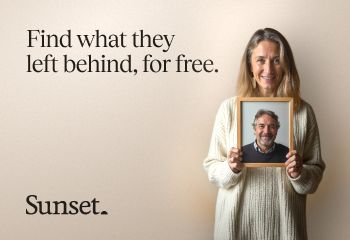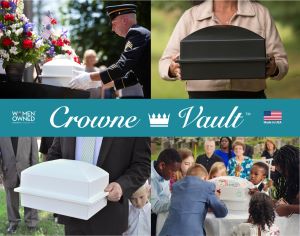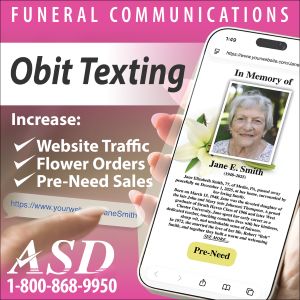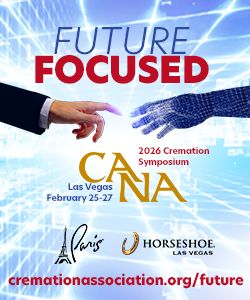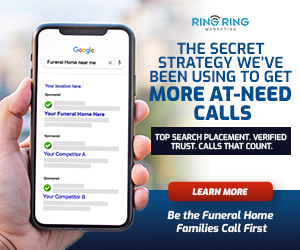Consumer group calls for “cutting out the funeral director as middleman” on direct cremations

We noticed in this article last week that a consumer group has asked for the removal of funeral directors as “the middleman in cremations, saying it’s costing people money”. Among other things, the group says “it gives them (funeral directors) the opportunity to “hook people into a package deal” charging grieving families for things they did not need”.
This discussion is taking place in New Zealand where 80% of the deaths are cremations and funeral directors are required to facilitate a “sign-off” for the cremation approval by a second doctor after a physician has already made the notes about the cause of death.
It appears, from what I read, that funeral directors then charge a service fee for this task and the process allows them to get in front of families who don’t necessarily want to be sold or educated about additional services available.
The consumer group is asking for a system in which the current online death documents system could solve this problem by uploading the first doctor’s information into the cloud from which the second doctor could access the information and sign the cremation authorization without the need of a funeral director. According to the linked article a recent health system report stated:
“. . . .the current process and regulations impose high costs on the public and create a barrier for people who want to organise their own funerals, particularly when their loved ones are about to be cremated. It encouraged the ministry to prioritise further work on updating the cremation regulations, and requested a report on the planned changes to regulations before the end of this parliamentary term. We also encourage the ministry to consider making all documents relating to cremation available on the Death Documents website. We note that the Ministry’s planned work could address the current barriers to DIY funerals.”
As can be expected, the New Zealand Funeral Director’s Association refuted the consumer groups thesis that it was this activity that produced high costs of services in New Zealand. Part of their answer came in this article from RNZ titled “Changing paperwork is not going to fix funeral debt”: Association slams call to remove funeral directos as cremation middlemen“.
Related Article –– High cost of dying under scrutiny as Members of Parliament call for change. The Spinoff (New Zealand)

Tom Anderson
Funeral Director Daily
Funeral Director Daily take: While this argument is taking place in a country with less than 40,000 deaths annually I think the repercussions may be heard in more populated places as time moves forward.
I was priviliged to see just how large a metropolitan funeral and cremation company can be in May when I had the privilige to tour a “Care Center” of a large American death care consolidator. I was somewhat blown away by the facility and volume of the operations in this care center located in a suburb of a large American city.
The brand new facility looked like a modern office building from the outside, but inside housed three crematory retorts, a preparation room, a refrigerated room with a capacity of probably over 300 bodies, and an inside the building drive-thru transportation hub for hearses and vans to load and unload human remains. It also housed a reception viewing area for a family that might wish to identify and see their loved one loaded into the crematory. And, the complete facility was absolutely immaculate.
My tour guide let me know that this care center handles about 7,000 cremation cases a year for their locations in this metropolitan area. I saw what I would guess was about 75 cardboad box encased bodies ready for cremation in the cooler area. One side of the cooler area had containers with “Red stickers” on the boxes and the other side had containers with “Green stickers” on the boxes.
I learned that the “Red sticker” boxes did not yet have authorizations complete for cremation while the “Green sticker” boxes had completed authorizations and were ready to be placed in the crematories. I also learned that there were two full-time staff members that did nothing but make sure authorizations were complete.
In all, it was an impressive operation.
Some interesting thoughts that I had — There was at least one licensed funeral director on site as well as other technicians. However, in a state where removal transportation specialists are allowed and the cremations are allowed to be arranged online, is it possible that a family member would never have to have a discussion with a funeral director? . . And, it may be by their choice that the family has that option.
I found that an interesting question. Some families would probably want to have that conversation and arrange some type of memorial and/or memorialization but there might also be some families that, as suggested in the New Zealand situation, may simply want a “Do it yourself” service or no service at all and be content with not talking with a funeral director.
I’m still working on my “Attitude adjustment” — I did my work in a funeral home that served “one family at a time”. And that is the way it was some weeks — we might only serve one family in a slow week. So, to see the volume of deceased human beings in this facility was “eye-opening” to me.
This consolidator, as it appeared to me, was also serving “one family at a time”. The only difference with my funeral business was I, on average served about one family at a time per day. . . . .and this company, through this facility, was serving one family at a time every 75 minutes.
They were, however, and as far as I could see doing it like I did — with dignity and respect and, most importantly, the way the family had asked for it to be done.
It made me realize that the way families are choosing and going-thru the Death Care operation and cycle today is very different than from when I first started.
It also made me think — will we become like New Zealand where it seems that some consumers would prefer to be “slightly distant” and not interact with funeral directors?
More news from the world of Death Care:
- State attorney recommends closing Savory & SonsFuneral Home after hearing. Video News Story and Print article. KBMC News – Kansas City (MO)
- Human composting is illegal in Michigan with one loophole. WKFR Radio (MI)
- Not burned or buried. How Australians are rethinking death. SBS News (Australia)
- “Boil in the bag’ funerals could be introduced in UK after European roll-out in Ireland. Yahoo News UK from Manchester Evening News (United Kingdom)
Enter your e-mail below to join the 3,164 others who receive Funeral Director Daily articles daily:
“A servant’s attitude guided by Christ leads to a significant life”







